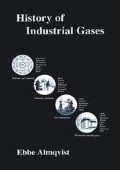Abstract
Philosophers in ancient Greece believed that everything in the universe could be reduced to one simple elementary substance. Thales (640–546 BC) concluded that this substance was water. Anaximenes (560–500 BC) believed it was air, Heraclitus (536–470 BC) thought that it was fire, and Xenophanes (570–480 BC) guessed that earth might be the fundamental element of the universe. Empedocles (490–430 BC) suggested that there were four basic elements: earth, water, air, and fire. To these Aristotle (384–322 BC) (Fig. 2.1.1) added a fifth, aether, the element of the heavens. For centuries these were accepted as the elements that made up the universe. In our day we recognize them as states of matter: solid, liquid, gas, and plasma.
Access this chapter
Tax calculation will be finalised at checkout
Purchases are for personal use only
Preview
Unable to display preview. Download preview PDF.
References
Riedel, E., and Schram, J. (1994). Gas Antik: Episoden aus der Geschichte der Gase. Gas Aktuell 50:30–38.
Ganot, A. (1873). Elementary Treatise on Physics Experimental and Applied (trans. E. Atkinson). London: Longmans Green.
Further Reading
Partington, J. R. (1962). A History of Chemistry, Vol. 3. London: Macmillan.
Strube, W. (1976). Der historische Weg der Chemie, Vols. 1 und 2. Leipzig: VEB Deutscher Verlag für Grundstoffindustrie.
Szabadváry, F. (1996). History of Analytical Chemistry. Oxford: Pergamon Press.
References
Anderson, R. G. W. (1884). From chaos to gas: Pneumatic chemistry in the 18th century. In Proceedings of the 3rd BOC Priestley Conference, pp. 392–407.
Ramsay, W. (1905). The gases of the atmosphere. London: Macmillan.
Weeks, M. E. (ed.). (1935). The discovery of the elements. Easton, PA: Mack Printing Co.
Kauffman, G. B. (1989). The making of modern chemistry. Nature 338:699–700.
Brody, J. (1987). Marie Lavoisier. Behind every great scientist. New Scientist 1987(December 24/31):19–21.
Further Reading
Ihde, A. J. (1964). The Development of Modern Chemistry. New York: Harper & Row.
Szabadvary, F. (1966). History of Analytical Chemistry. Oxford: Pergamon Press.
References
Weeks, M. E. (ed.). (1935). The discovery of the elements. Easton, PA: Mack Printing Co.
Andersson, R. G. W. and Lawrence, C. (eds.). (1987). Science, Medicine and Dissent: Joseph Priestley (1733-1804). London: Wellcome Trust/Science Museum.
Wilson, M. (1954). Priestley. Scientific American 1954(10):68–73.
Austerfield, P. (1983). Dr Phlogiston, the ‘honest heretic’. New Scientist 1983(March 24):812–814.
Neville; R. G. (1974) Steps leading to the discovery of oxygen, 1774. Journal of Chemical Education 51(7):428–431.
Cassebaum, H., and Schufle, J. A. (1975). Scheele’s priority for the discovery of oxygen. Journal of Chemical Education 52(7):442–444.
Duveen, D. I. (1956). Lavoisier. Scientific American 1956(5):85–94.
Holmes, F. L. (1994). Antoine Lavoisier. The conservation of matter. Chemical and Engineering News 1994(Sept 12):38–45.
Author information
Authors and Affiliations
Rights and permissions
Copyright information
© 2003 Springer Science+Business Media New York
About this chapter
Cite this chapter
Almqvist, E. (2003). From Aristotle to the Birth of Modern Chemistry. In: History of Industrial Gases. Springer, Boston, MA. https://doi.org/10.1007/978-1-4615-0197-8_2
Download citation
DOI: https://doi.org/10.1007/978-1-4615-0197-8_2
Publisher Name: Springer, Boston, MA
Print ISBN: 978-1-4613-4962-4
Online ISBN: 978-1-4615-0197-8
eBook Packages: Springer Book Archive

